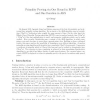Free Online Productivity Tools
i2Speak
i2Symbol
i2OCR
iTex2Img
iWeb2Print
iWeb2Shot
i2Type
iPdf2Split
iPdf2Merge
i2Bopomofo
i2Arabic
i2Style
i2Image
i2PDF
iLatex2Rtf
Sci2ools
CRYPTO
2003
Springer
2003
Springer
Primality Proving via One Round in ECPP and One Iteration in AKS
On August 2002, Agrawal, Kayal and Saxena announced the first deterministic and polynomial time primality testing algorithm. For an input n, the AKS algorithm runs in heuristic time ˜O(log6 n). Verification takes roughly the same amount of time. On the other hand, the Elliptic Curve Primality Proving algorithm (ECPP), runs in random heuristic time ˜O(log6 n) ( ˜O(log5 n) if the fast multiplication is used), and generates certificates which can be easily verified. More recently, Berrizbeitia gave a variant of the AKS algorithm, in which some primes cost much less time to prove than a general prime does. Building on these celebrated results, this paper explores the possibility of designing a more efficient algorithm. A random primality proving algorithm with heuristic time complexity ˜O(log4 n) is presented. It generates a certificate of primality which is O(log n) bits long and can be verified in deterministic time ˜O(log4 n). The reduction in time complexity is achieved by ...
| Added | 06 Jul 2010 |
| Updated | 06 Jul 2010 |
| Type | Conference |
| Year | 2003 |
| Where | CRYPTO |
| Authors | Qi Cheng |
Comments (0)

